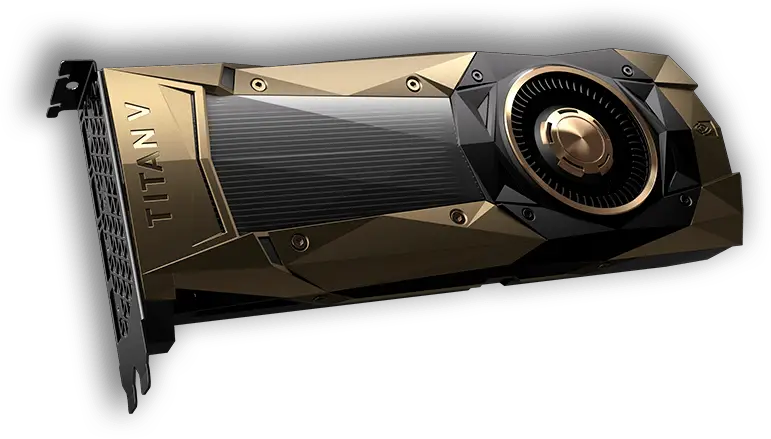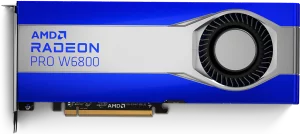10 Most Expensive Graphics Cards In The World
NVIDIA Ampere A10, PCIe, 150W, 24GB Passive, Single Wide, Full Height GPU – $4,067.44
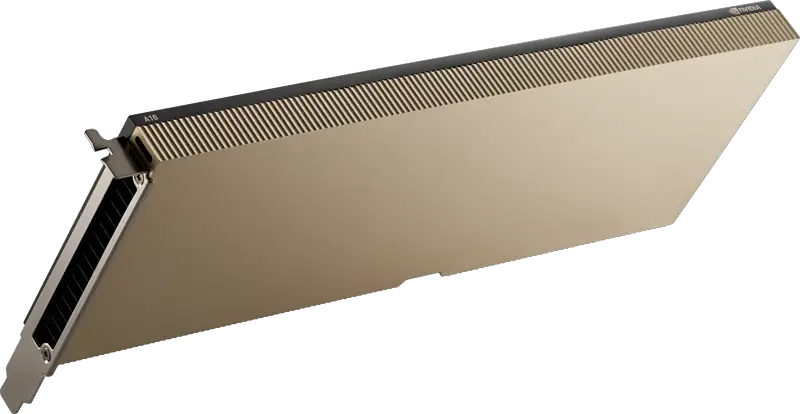
The NVIDIA Ampere A10 is a versatile high-performance GPU designed for a variety of demanding applications, including data centers, workstations, and gaming systems. Key features include:
- Memory: 24GB, which provides ample capacity for complex tasks.
- Connectivity: Utilizes the PCIe interface, ensuring compatibility with modern systems.
- Power Consumption: 150W, which is relatively efficient for its performance class.
- Form Factor: Designed for a single wide, full-height slot, making it suitable for various chassis types.
- Cooling: Passive design, meaning it relies on the system’s overall cooling, making it ideal for quieter environments.
The Ampere A10 excels in applications such as 3D rendering, machine learning, and high-resolution video playback, delivering robust performance with efficient power usage. Its passive cooling design also makes it a good choice for noise-sensitive settings.
PNY NVIDIA Quadro RTX 6000 – $4,999.99
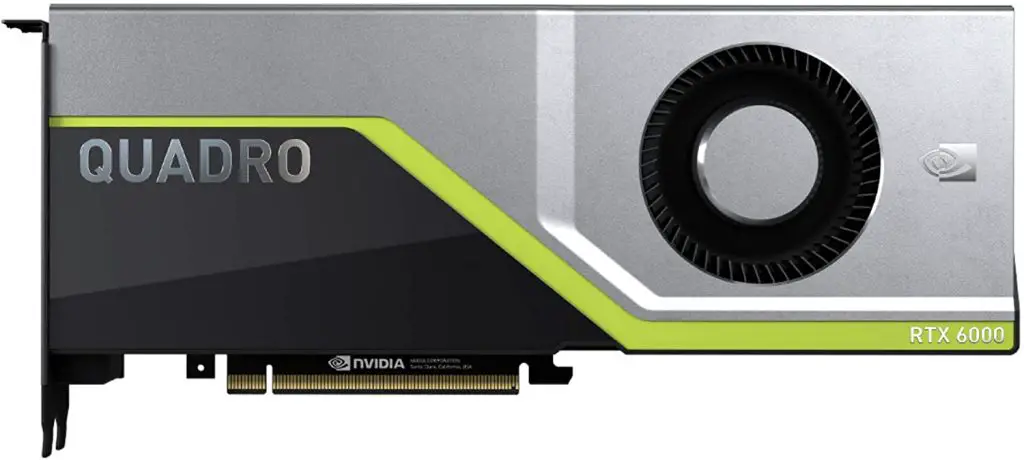
The PNY NVIDIA Quadro RTX 6000 is indeed a top-tier graphics card tailored for professional use, particularly in fields like 3D design, engineering, and scientific visualization. Here are its key features:
- Architecture: Based on NVIDIA’s Turing architecture.
- RT Cores: 48 RT cores, enabling real-time ray tracing capabilities.
- CUDA Cores: 4,608 CUDA cores, providing substantial computational power for parallel processing tasks.
- Memory: 24GB of GDDR6 memory (not 6GB), offering significant bandwidth and storage for large datasets and complex projects.
- Real-Time Ray Tracing: Supports real-time ray tracing, enhancing visual realism in rendering tasks.
- Deep Learning: Equipped to handle deep learning tasks efficiently, making it suitable for machine learning applications.
The high price point of the Quadro RTX 6000 reflects its advanced features and performance capabilities, making it a valuable investment for professionals who need top-level performance for demanding applications.
NVIDIA Tesla M10 GPU CusKit – $5,157.81
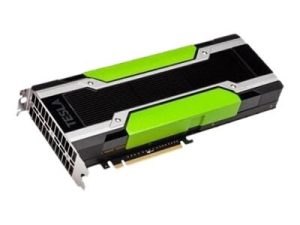
The NVIDIA Tesla M10 GPU CusKit is a highly capable graphics processing unit designed for data centers and cloud computing environments. Here are its key features and capabilities:
- Architecture: Part of the NVIDIA Tesla M10 series, optimized for virtual desktops and applications.
- Memory: Each of the four GPUs in the CusKit has 16GB of GDDR5 memory, totaling 64GB. This substantial memory capacity is crucial for handling multiple virtual desktops and applications simultaneously.
- Performance: Capable of delivering up to 10 TFLOPS of single-precision floating-point performance, making it suitable for high-performance computing applications.
- GPUDirect RDMA: This feature enables direct connections to high-bandwidth networks and devices such as InfiniBand or RoCE, ensuring fast and efficient data transfers.
- NVIDIA GRID Software: Allows multiple users to access and share the GPU resources in a virtualized environment, facilitating efficient resource allocation and management.
The Tesla M10 GPU CusKit is an ideal solution for data centers and cloud computing environments that need to support a large number of virtual desktops and applications, offering powerful performance and efficient resource management.
PNY NVIDIA Quadro RTX A6000 graphics card, 48GB GDDR6, 4x DP ports, 300W, PCIE 3.0 Retail Box – $5,499.99
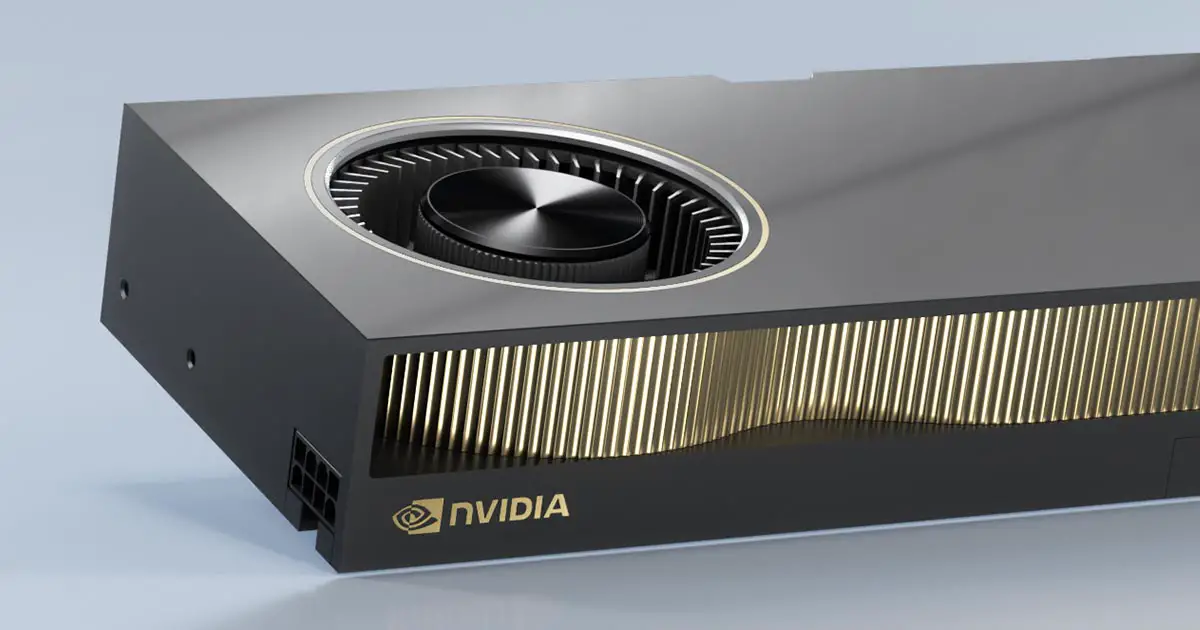
The PNY NVIDIA Quadro RTX A6000 is an advanced graphics card tailored for professionals working in demanding fields such as 3D animation, video editing, and scientific simulations. Here are the key features and specifications:
- Architecture: Based on NVIDIA’s Ampere architecture, providing significant performance improvements over previous generations.
- Memory: Equipped with 48GB of GDDR6 memory, which is ideal for handling large datasets and complex projects.
- Display Outputs: Includes 4 DisplayPort ports, allowing for multi-monitor setups and high-resolution displays.
- Power Supply: Requires a 300W power supply, reflecting its high-performance capabilities.
- Interface: Designed for use with a PCIe 3.0 interface, ensuring compatibility with a wide range of workstations and servers.
- Retail Package: The retail box version includes the graphics card and related documentation, ensuring users have the necessary information for installation and operation.
The Quadro RTX A6000 is a powerful tool for professionals needing top-tier performance and reliability for their computational and graphical tasks. Its large memory capacity, high bandwidth, and robust architecture make it an excellent choice for intensive applications.
PNY NVIDIA Quadro RTX 8000 – Graphics card – Quadro RTX 8000 – 48 GB GDDR6 – PCIe 3.0 x16 – 4 x DisplayPort, USB-C – retail – $6,699.99
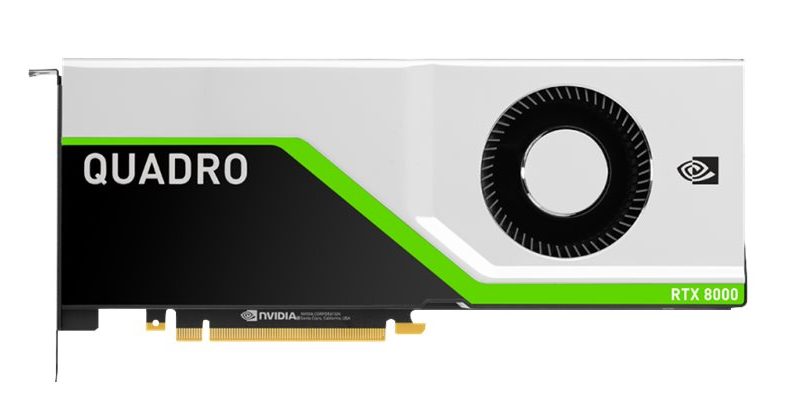
The PNY NVIDIA Quadro RTX 8000 is an elite graphics card tailored for professionals in fields such as 3D design, engineering, and scientific research. Here are its key specifications and features:
- Memory: 48GB of GDDR6 memory, providing the capacity and bandwidth required for handling large datasets, complex 3D models, and simulations efficiently.
- Display Outputs: Equipped with 4 DisplayPort connections and a USB-C port, facilitating multi-monitor setups and seamless connectivity with other devices.
- Interface: Compatible with PCIe 3.0 x16 slots, ensuring fast data transfer speeds and reliable performance.
- Applications: Suitable for a broad range of professional applications, including 3D visualization, video editing, and virtual reality, thanks to its powerful rendering capabilities.
- Retail Package: The card is available in a retail package, making it straightforward to purchase and install in any compatible system.
The Quadro RTX 8000 is designed to deliver top-tier performance and reliability, making it an excellent choice for professionals who require robust graphical and computational power for their work.
NVIDIA Ampere A40, PCIe, 300W, 48GB Passive, Double Wide, Full Height GPU – $7,524.11
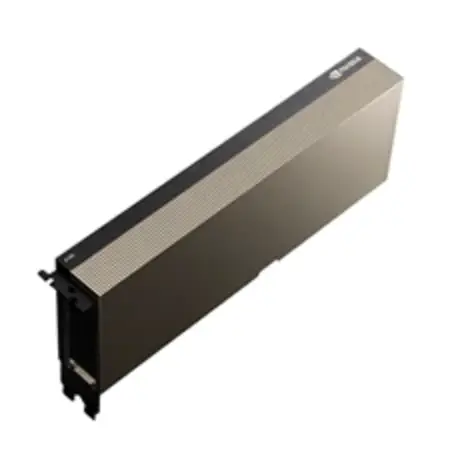
The NVIDIA Ampere A40 is a high-performance GPU tailored for professional applications, particularly in data centers and scientific research. Here are its key features and specifications:
- Memory: Boasts 48GB of memory, providing ample capacity for handling large datasets, complex calculations, and high-resolution simulations.
- Power Supply: Requires a 300W power supply, suitable for high-performance systems that demand significant power.
- Form Factor: Designed for installation in a double-wide, full-height PCIe slot, ensuring compatibility with a wide range of server and workstation systems.
- Cooling: Passively cooled, which means it lacks active cooling components like fans. This design choice enhances reliability and reduces the likelihood of mechanical failures.
- Applications: Ideal for demanding professional applications, including data center operations, scientific research, and other fields requiring substantial computational power and memory.
The NVIDIA Ampere A40’s combination of high memory capacity, robust power requirements, and reliable passive cooling make it a strong choice for professionals who need a dependable and powerful GPU for intensive tasks.
AMD MI100,300W PCIe, 32GB Passive, Double Wide, GPU Customer Install – $9,819.14
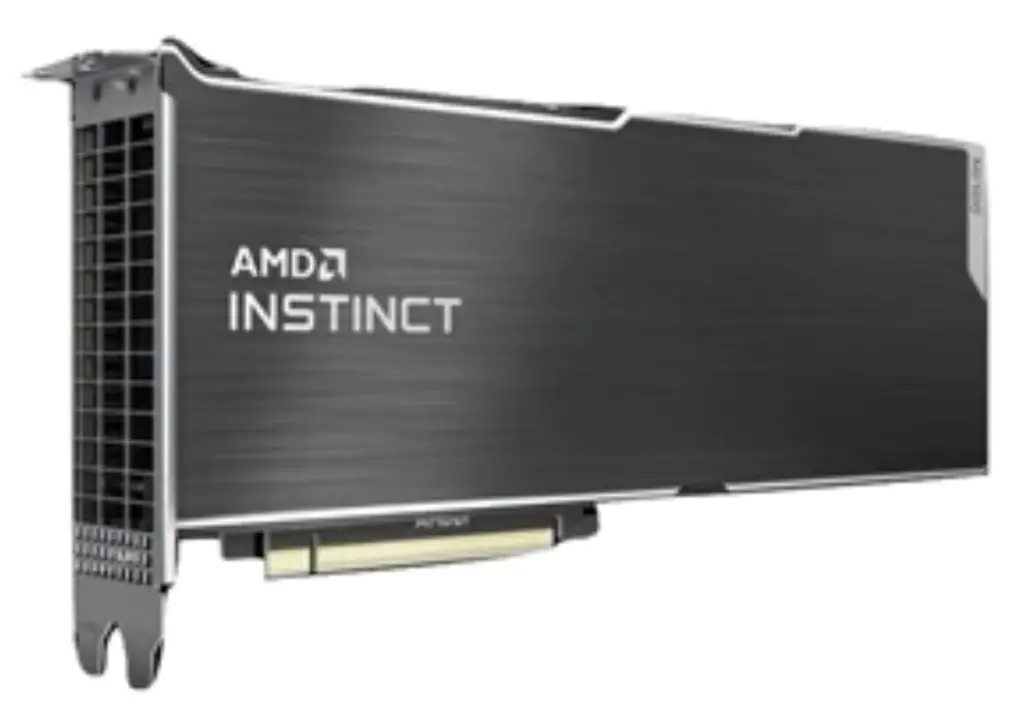
The AMD MI100,300W PCIe is a high-performance GPU designed for customer installation, catering to various demanding applications. Here are its key features and specifications:
- Memory: 32GB of memory, providing significant capacity for handling complex computations and large datasets.
- Power Output: 300 watts, indicating it requires substantial power to deliver its high performance.
- Interface: Compatible with the PCIe interface, ensuring it can be integrated into a wide range of systems.
- Form Factor: Double-wide, occupying two slots in a motherboard or other device, which is typical for high-end GPUs.
- Cooling: Equipped with a passive cooling system, meaning it does not have active cooling components like fans. This design reduces noise and increases reliability by eliminating moving parts prone to failure.
- Applications: Suitable for a variety of applications, including data centers, scientific research, and other high-performance computing tasks.
The AMD MI100,300W PCIe combines robust performance with reliability, making it an excellent choice for professionals who require a powerful GPU for intensive workloads and value a quieter, maintenance-free cooling solution.
Dell NVIDIA Quadro GV100 32GB Graphics Card – $11,999.99
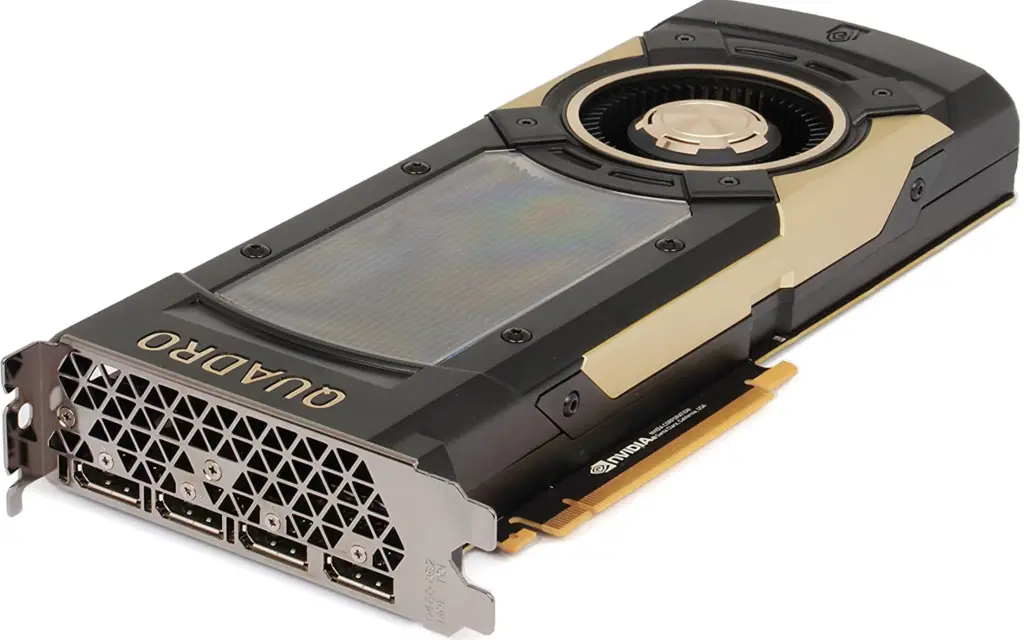
The Dell NVIDIA Quadro GV100 32GB Graphics Card is an advanced graphics solution tailored for professional workstations. Here are its key features and specifications:
- Architecture: Based on the NVIDIA Volta architecture, which provides significant improvements in performance and efficiency.
- Memory: Features 32GB of high-bandwidth memory (HBM2), ensuring the capacity and speed necessary for handling large and complex tasks.
- Applications: Ideal for demanding tasks such as 3D rendering, scientific simulations, and machine learning applications, where high levels of graphics processing are required.
- Display Outputs: Supports multiple display outputs, allowing for versatile multi-monitor setups.
- Software Tools: Comes with a range of professional-grade software tools, including:
- NVIDIA Mosaic: Enables seamless multi-display setups.
- NVIDIA nView: Provides advanced desktop management capabilities.
- NVIDIA Professional Visualization: Enhances the efficiency and quality of professional visualization tasks.
The Dell NVIDIA Quadro GV100 32GB Graphics Card is a top-tier choice for professionals who need high precision, speed, and reliability in their graphics tasks. Its combination of advanced architecture, substantial memory, and professional tools makes it suitable for a wide range of high-performance applications.
NVIDIA Ampere A100, PCIe, 300W, 80GB Passive, Double Wide, Full Height GPU Customer Install – $17,181.09
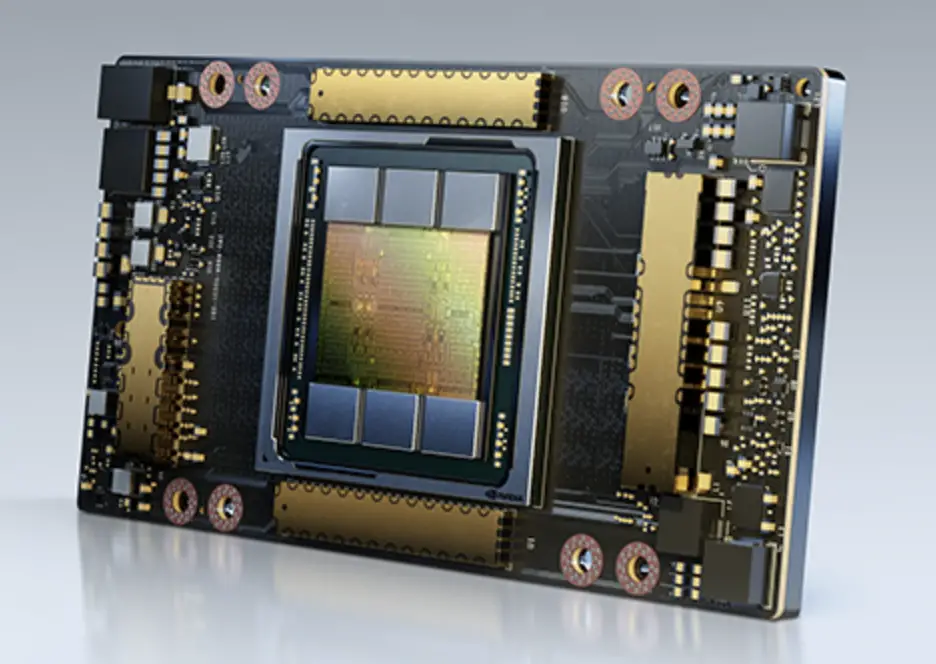
The NVIDIA Ampere A100 is indeed a high-performance GPU designed primarily for data centers and high-performance computing environments. Here are its key features and specifications:
- Architecture: Built on NVIDIA’s Ampere architecture, optimized for maximum performance and efficiency.
- Memory: Offers a substantial 80GB of passive memory, facilitating fast data transfer and enhancing performance in complex computational tasks.
- Power Consumption: Requires 300W of power, reflecting its high-performance capabilities and ensuring stable operation.
- Form Factor: Comes in a double-wide, full-height form factor, occupying two slots in a server rack and designed to fit standard PCIe slots on motherboards.
- GPU Boost Technology: Utilizes NVIDIA’s GPU Boost technology to dynamically adjust clock speeds and voltages, optimizing performance based on workload demands.
- Installation: As a customer-installed product, it requires careful installation following NVIDIA’s provided instructions to ensure proper functionality and integration into the system.
The NVIDIA Ampere A100 is tailored for environments where robust computational power and efficient data handling are crucial, making it suitable for a wide range of high-performance computing tasks, including AI training, scientific simulations, and data analytics.
People also ask
What is the highest graphics card?
What is the most overkill GPU?
The NVIDIA GeForce RTX 4090 is often considered the most overkill GPU available. It features the latest Ada Lovelace architecture, 24GB of GDDR6X memory, and exceptional performance capabilities for gaming, AI, and professional applications.
Another notable mention is the ASUS ROG Matrix GeForce RTX 4090, which enhances the already powerful RTX 4090 with advanced cooling solutions and higher factory overclocks.
What is the fastest RTX 4090?
The NVIDIA GeForce RTX 4090 is currently the highest-performing graphics card available. It features the latest Ada Lovelace architecture, 24GB of GDDR6X memory, and exceptional capabilities for gaming, AI, and professional applications.
What is the #1 GPU?
As of now, the NVIDIA GeForce RTX 4090 is widely considered the top GPU in terms of performance. It leads the market with its cutting-edge Ada Lovelace architecture, 24GB of GDDR6X memory, and exceptional capabilities for gaming, AI, and professional applications.
What is the rarest graphics card?
One of the rarest graphics cards is the 3dfx Voodoo5 6000. This card was never officially released, but a few prototypes were made. It featured four VSA-100 processors and was highly anticipated in its time.
Another rare card is the NVIDIA GT 1010, which was released exclusively in China for OEM PCs and was not widely available.
What graphics card is fastest?
The NVIDIA GeForce RTX 4090 is currently the fastest graphics card available. It features the latest Ada Lovelace architecture, 24GB of GDDR6X memory, and exceptional performance capabilities for gaming, AI, and professional applications.
What is the biggest GPU ever?
The NVIDIA GH100 Hopper is considered one of the largest GPUs ever made, with a die size of around 1000 mm². This massive GPU is designed for high-performance computing and AI applications.
In terms of physical dimensions, the Zotac PGF RTX 4090 D is one of the longest GPUs, measuring just over 38 cm. Another notable mention is the Aorus RTX 4090 Master, which is also known for its large size, requiring a very spacious case.
What GPU gets the hottest?
The AMD Radeon RX 6900 XT is known to run quite hot, especially under heavy loads. It can reach temperatures up to 110°C (230°F) in some cases. This is partly due to its high power consumption and performance capabilities.
Another GPU that tends to get very hot is the NVIDIA GeForce RTX 3090. It can also reach high temperatures, especially when running demanding applications or games.
What GPU to avoid?
When considering which GPU to avoid, it often depends on your specific needs and the context of your build. However, here are a few general pointers:
- Older Models: GPUs like the NVIDIA GTX 700 series or AMD R9 200 series are quite outdated and may not support newer games or applications efficiently.
- Low-End GPUs: Cards such as the NVIDIA GT 1030 or AMD Radeon RX 550 might struggle with modern games and demanding applications.
- Overheating Issues: Some GPUs, like the AMD Radeon RX 5700 XT, have been known to run hot, which can lead to thermal throttling and reduced performance if not properly cooled.
It’s always a good idea to check reviews and benchmarks for the specific GPU you’re considering to ensure it meets your needs.
What is the weakest GPU ever?
One of the weakest GPUs ever released is the NVIDIA GeForce 210. It was an entry-level card that offered very limited performance, making it unsuitable for gaming or demanding applications.
Another contender is the Intel740, which was known for its poor performance and lack of features compared to its competitors at the time.
What GPU can run everything?
The NVIDIA GeForce RTX 4090 is currently one of the best GPUs that can handle almost anything you throw at it. Whether it’s high-end gaming, 4K video editing, AI workloads, or other demanding applications, this GPU is designed to deliver top-tier performance across the board.
Another strong contender is the AMD Radeon RX 7900 XTX, which also offers excellent performance for a wide range of tasks.

